Crime in the Cabbage Patch
a new documentary digs into the history of the '80s favorite (don't call them) dolls
Full disclosure: My partner Jonathan Alexandratos appears in this film, but I promise I would be writing about it anyway!
Billion Dollar Babies: The True Story of the Cabbage Patch Kids, which opened nationally on Black Friday, has more crime than you might imagine for a documentary about an adorable and nostalgic toy property. The film’s narrative explores the design and marketing choices, that together with the cultural climate of the ‘80s, synthesized to produce a pop culture phenomenon so irresistible that adults were fighting each other in the aisles of their local retail stores to procure a doll.
However, over the course of the story of the rise of Cabbage Patch, the spectre of criminal activity sprouts like weeds in a well-tilled field.1 What follows are some of the more questionable behaviors of corporate actors, desperate parents, and one exceedingly canny salesman brought to light by the film.
Dupe Babies
In the wake of a popular product, the knock-offs will surface, and Cabbage Patch Kids were no exception. Though I was the prime age for desiring one of these dolls in the ‘80s, and definitely had parents who would have balked at the $25 retail price,2 I don’t remember asking for a Flower Kid, Fruit Kid, or Sweet Love doll. One interviewer in the documentary describes the Cabbage Patch crew as notably litigious, and I suppose when counterfeiters were selling fakes that reeked of kerosene and were highly flammable, some oversight was necessary.
The most culturally resonant CPK “knockoff” is, to me, more in the family of parody. Who remembers Garbage Pail Kids? These trading cards took direct aim at the sweet, some might say saccharine, marketing of the Cabbage Patch Kids and skewered it.
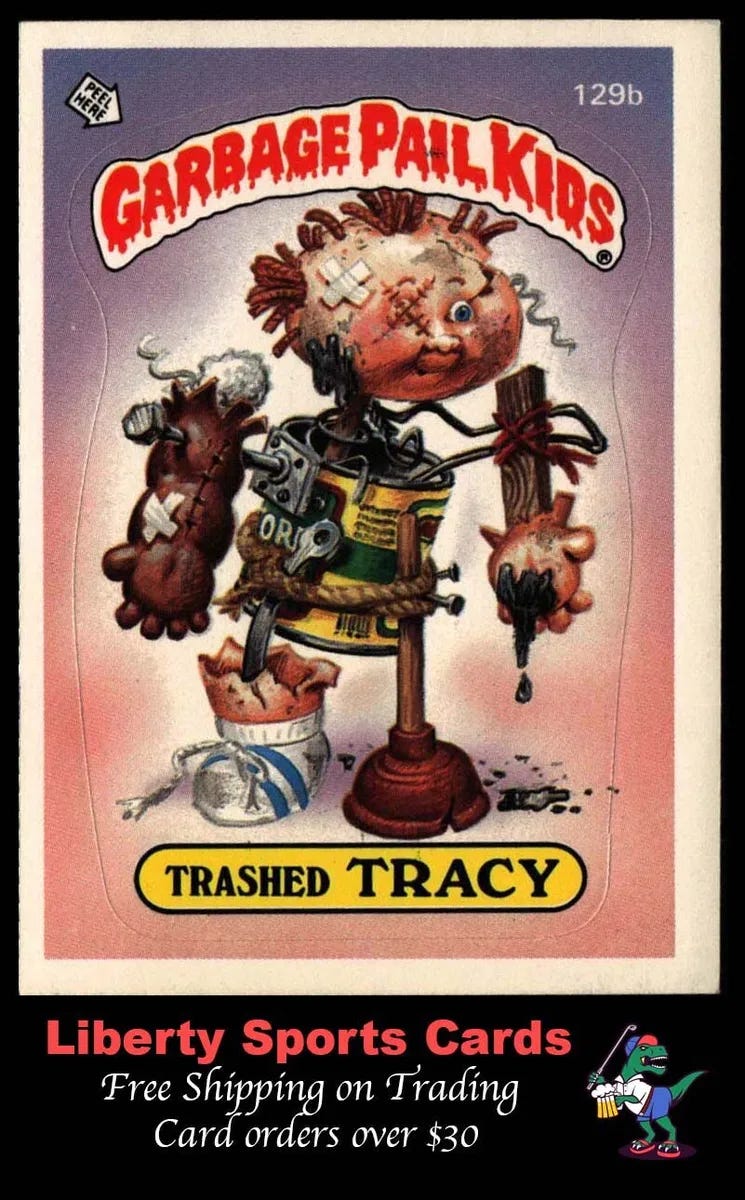
Parody is protected from copyright laws, so apparently the Federal district judge who ruled in favor of Roberts’s company didn’t agree with my read of the relationship between the two properties. Topps agreed to change the look of the cards’ illustrations and change the logo.
Retail Fight Club
Some of the most vivid visuals in the film come from footage of the infamous Black Friday of 1983, where nationwide, parents, older siblings, and presumably would-be CPK flippers3 descended on retails stores to purchase dolls, and unexpectedly, hands were thrown.
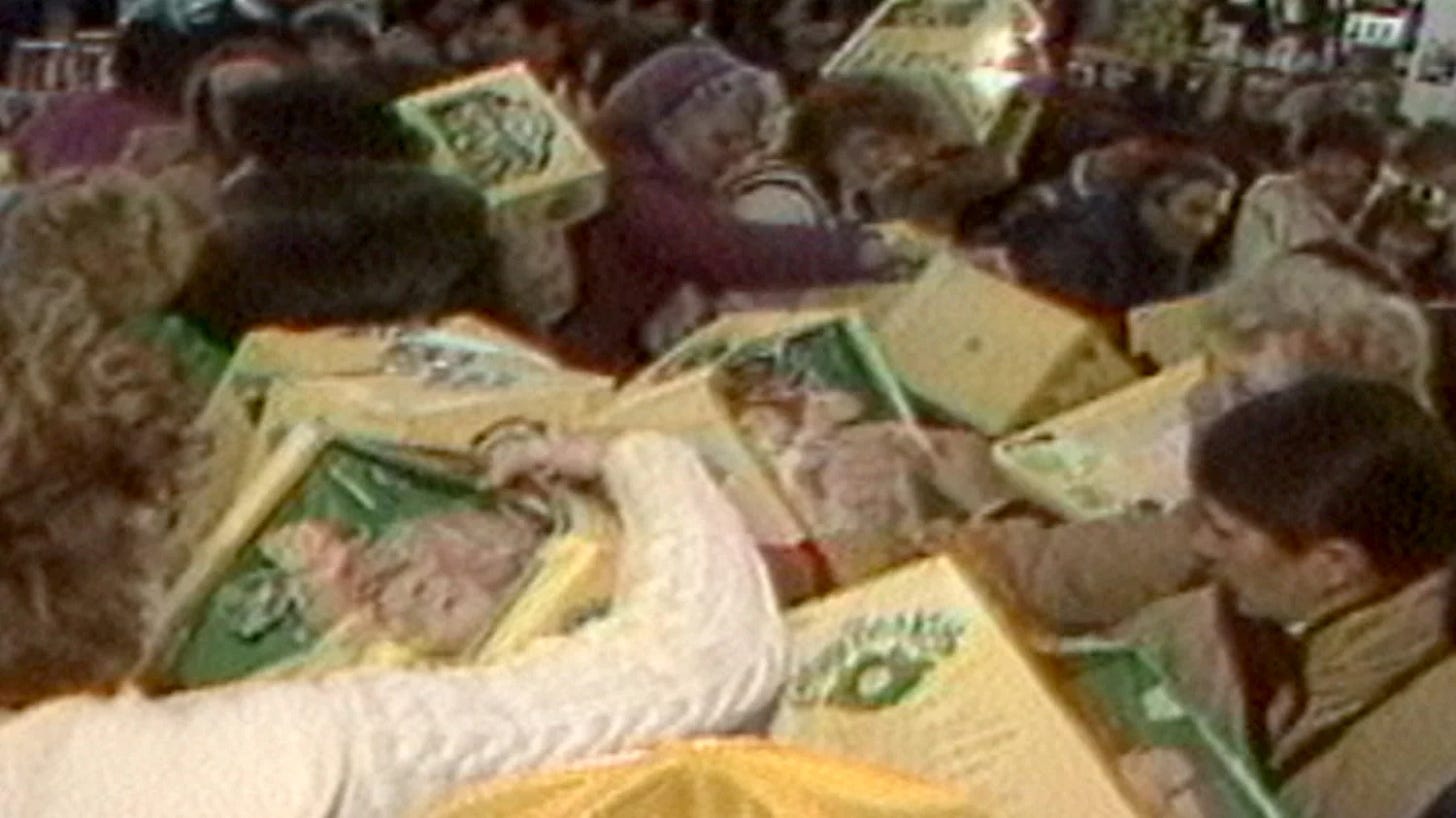
The documentary explains how flat-footed the company was caught by the immense and instant popularity of Cabbage Patch, putting to rest rumors that the scarcity was artificially created to stoke demand. The dozens of people who fell for the fradulent promise of an airdrop of Kids at Milwaukee County Stadium was an early indication of the mania that would find its fullest expression in the fall and winter of 1983. I’m unable to find any evidence of whether charges were filed in relation to injuries sustained during the riots, but injuries were reported. A seventy-five year old man in Miami and a pregnant woman in New Jersey were knocked down and trampled, and a Pennsylvania woman got her leg broken.
The unkindest harvest of all
One of the things you learn watching Billion Dollar Babies is how meticulously the capitalist exchange of money for a mass produced product was intentionally effaced by Xavier Roberts and original licensor Coleco in order to sell not only a toy, but a unique experience of familial bonding. When Roberts impishly declares in the first few moments of his interview that the viewers “might not know” him, but he “could be the father of some of your children,” he’s sort of creepily referencing the fiction that was so much a part of Cabbage Patch marketing: you are not buying a doll, you are adopting a baby. The uniqueness of each product (different names; hair, eye, and skin colors; glasses; freckles) was marketed as proof that these dolls were special, and if you had one, so were you. Babyland General Hospital in Roberts’s home state of Georgia takes this fantasy to its natural, if somewhat horrifying, conclusion by staging theatrical “births” of the dolls from heads of cabbage, placing them in incubators, and having customers sign adoption papers.
This erasure of the monetary, industrial, and marketing systems that produce the dolls is heartbreakingly forecasted and magnified by the shady dealings that led Xavier Roberts to be the face
of Cabbage Patch. If you’ve heard of Martha Nelson Thomas, it’s not because Xavier Roberts wanted you to. Her “Doll Babies,” which she sold in small bespoke batches at folk art festivals, were unquestionably the inspiration for, and first iteration of, the Kids.
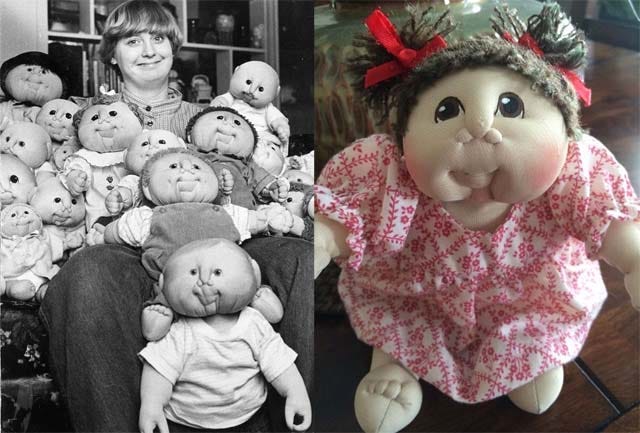
Roberts admits as much in the doc, stating that he never would have been thought to soft sculpt the faces and bodies of the dolls without learning from Thomas. However, she had to sue him in 1979 to get any recognition, or any of the millions Roberts had made by that time. Because Thomas had never established copyright on her creations she didn’t have much of a legal leg to stand on, so it’s telling that Roberts settled anyway for an undisclosed amount. Seeing Roberts and the former president of the company tie themselves in knots trying to acknowledge the obvious similarities between the dolls while still maintaining the capitalist fantasy that Roberts was a good ol’ boy who created the phenomenon all by himself is equal parts painful and infuriating. Though according to the courts he technically didn’t commit a crime, everyone seems awfully defensive about how Thomas was treated.
The film implicitly explores the place of art objects in the mass marketplace, and explicitly questions a legal and commercial system that rewards financial success at the cost of integrity and honesty about a product’s story and purpose. Billion Dollar Babies emphatically argues that toy history is history, and studying an individual toy, especially one as popular as Cabbage Patch, reveals much about the sociopolitical circumstances that produced and celebrated it. The documentary is only in theatres now, but I expect it will soon be streaming, so keep your eyes peeled! In the meantime, for another text that looks at the intersection between pop culture, crime, and politics, do yourself a favor and check out The Pez Outlaw!
Sorry for this and all future puns.
Around $77 in today’s money!
There were recorded sales on the Cabbage Patch black market for as high as two grand!

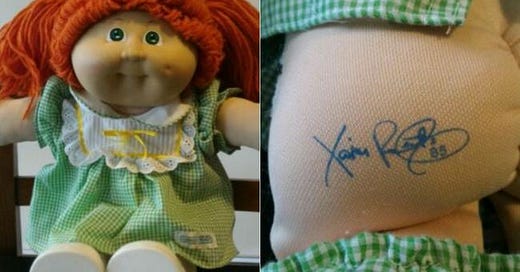


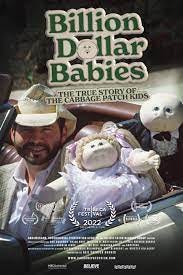

My grandma was OBSESSED with Cabbage Patch kids! My brother and I got one each from her for Christmas, and I am pretty sure it was because she really wanted one…and she did get one eventually. My grandparents took my brother and me to Babyland General on vacation too!
We accidentally stumbled upon Babyland General when we did a last minute trip to Helen GA right before the lockdown in 2020. The "birthing ceremony" is one of the trippiest things Paul and I have ever seen, especially because we had no clue there was one. It will be well worth the trip if you're in the area. SO bizarre.